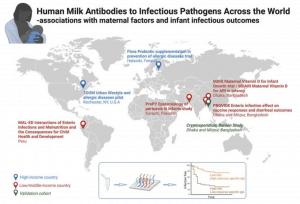Researchers discovered that breast milk plays a crucial role in protecting infants from rotavirus, a common gastrointestinal illness (Figure 1). Their findings reveal that infants whose mothers had higher levels of specific antibodies in their breast milk were less likely to contract the disease.
The researchers measured antibodies against a variety of pathogens, including rotavirus. They found that higher levels of IgA and IgG antibodies, two types of immunoglobulins commonly found in breast milk, were associated with reduced susceptibility to rotavirus infection.
Beyond rotavirus, the study also identified significant differences in antibody profiles between breast milk from women in high-income countries (HICs) and low- and middle-income countries (LMICs). Women in LMICs tended to have higher levels of antibodies against intestinal and respiratory pathogens, suggesting that their immune systems may be better equipped to combat these infections.
However, the study also uncovered an unexpected association between higher body mass index (BMI) and lower antibody levels in breast milk. This finding contradicts previous assumptions and suggests that obesity may have unintended consequences for maternal immunity.
Further research is needed to fully understand the factors that influence antibody levels and to develop strategies for optimising breastfeeding practices.
Journal article: Campo, J. J., et al. 2024. Human milk antibodies to global pathogens reveal geographic and interindividual variations in IgA and IgG. Journal of Clinical Investigation.
Summary by Stefan Botha

